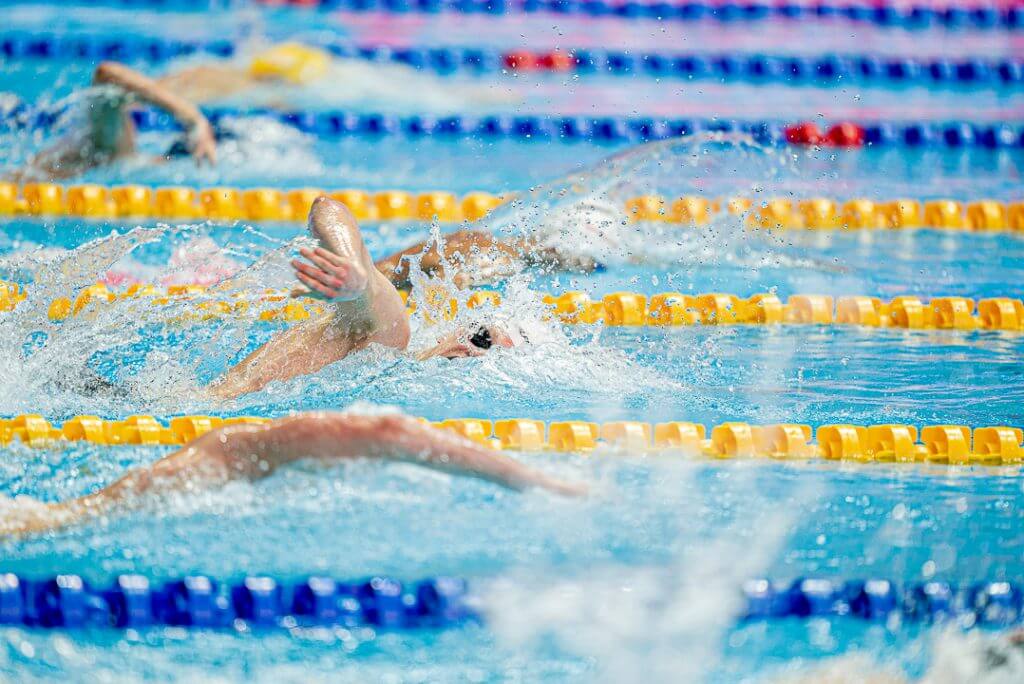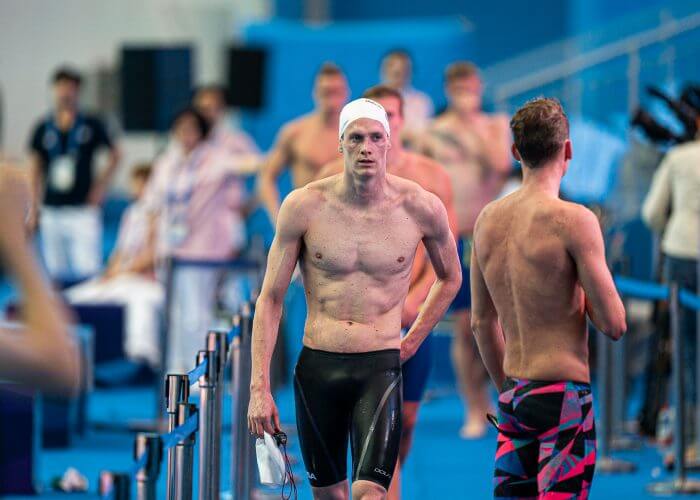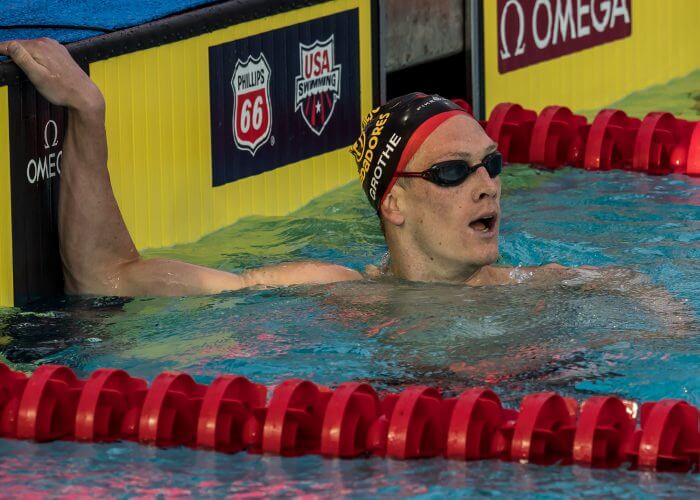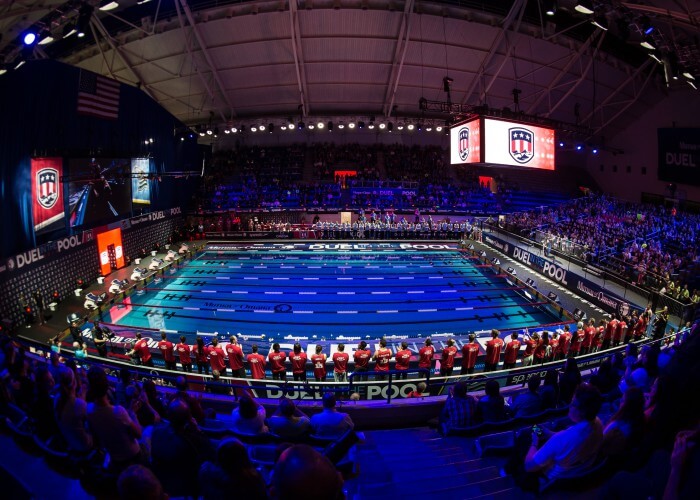Zane Grothe Ready to Fix World Championships Disappointment With Clear Mindset

Zane Grothe, DC Trident. In the lead-up to the first International Swimming League pro-team season, Swimming World will look at some of the pioneers of a new chapter unfolding in the sport. Today: USA’s best distance swimmer.
Pioneers Of Pro-Team Swimming
- Olivia Smoliga
- Katie McLaughlin
- Ian Finnerty
- Amy Bilquist
- Ella Eastin
- Ali DeLoof
- Hali Flickinger
- Breeja Larson
Zane Grothe came into the World Championships last summer as a potential medal spoiler in the 400, 800 and 1500 free. In 2018, he was ranked second in the world in the 800 free and was sixth in the 400 and 1500.
But his performances in the pool in Gwangju did not nearly reflect his potential. In the 400 free on the first day, he was eighth. In the 800, he missed the final by placing 11th. In the 1500, he finished a disastrous 26th.
After Worlds, he flew to California to participate in the U.S. Nationals in more familiar waters. His 1500 on the first day was 25 seconds faster than what he swam at Worlds nearly 96 hours prior, and his 800 on the last day of the meet was only three tenths slower than his Worlds performance.
For those wondering why only 4 days later I went 25 seconds faster in the mile…
I am also wondering…so…I just know you never give up on it
— Zane Grothe (@zane_growth_ee) August 1, 2019
After Nationals, he took the rest of the month of August off.
“I talked it over with Mike Westphal back in February actually that I wanted to take a long break after Worlds,” Grothe told Swimming World. “Going into Worlds I felt kind of burnt out. Mike always says there is no such thing as over training but I felt a little bit of that this year. I felt tired going into the meet and I wasn’t sleeping as much as I should have been.”

Zane Grothe after his disappointing 1500 at Worlds. Photo Courtesy: Becca Wyant
Grothe had been swimming in a bit of a rut after coming off of successful seasons in 2017 and 2018. He became the fastest distance swimmer in short course yards in 2017 and won his first international medals individually at Pan Pacs in 2018. All of that success over the last two years led to Grothe having “some serious high goals” heading into the 2018 Short Course World Championships in China.
“I wanted to break the American record pretty significantly,” he said.
But in China, he was sixth in the 400 and eighth in the 1500, nowhere close to either American record.
“I was so far off and I came back with a lot of questions. What happened? Why wasn’t I getting better?”
He had to make changes to his training, but he fell victim to complacency. And the results showed. That was when he sprouted the idea to take a long break at the end of the season.
Usually, Grothe would take around two weeks off after a season finished. But after the last couple years he didn’t take a lot of time off, saying he only took about four days after the 2017 World Championships in Budapest.
This time he needed to unwind.
“The last time I took a month off was after the 2016 U.S. Open. When I didn’t make the (Olympic) team in 2016, I wasn’t sure if I wanted to keep swimming. But a few weeks into coming back that fall I was putting down some of the best sets I had ever done.
“This year, I weighed myself on my first day back and I didn’t lose or gain any weight so that was a good sign.”
Zane Grothe is now 27 and will be 28 by the time the Olympic Trials hit in June. There is only so much a 27-year-old distance swimmer can change in his daily training, so Grothe found the best place to make changes in his swimming was in the way he recovered out of the water.
“I committed too much time to social media before Worlds. Since then I have set timers on my phone to limit my app usage and I try to have everything shut off by 9 p.m. and to be in bed by 9:30 or at the latest 10:00.
“It took me about two to three years to realize how important sleep really is.”
And it’s not just his sleeping habits that he has adjusted this year. His eating has changed for the better this year.
“I’m probably the oldest distance swimmer in the world behind Sun Yang. I can’t eat anything I want anymore like I could when I was 16. I’ve been really watching what I’m eating.”

Zane Grothe at 2018 US Nationals. Photo Courtesy: Peter H. Bick
All of this is in hopes Grothe will make the 2020 Olympic Team next year and have the potential to be one of the oldest rookies on the team for Tokyo. But before he chases his Olympic dreams, he will be a part of the newly-minted International Swimming League (ISL) where he is a member of the DC Trident.
The obvious goal of the league has been to increase popularity of the sport to outside audiences and also to keep the athletes themselves engaged in it longer. And it’s already showed just that, with the announced comebacks of Olympic champions Natalie Coughlin and Florent Manaudou.
The ISL events will be designed to be more about the presentation of the event rather than “just swimming back and forth” as Grothe put it. He even compared it to when he swam at the 2015 Duel in the Pool in Indianapolis and the 2017 Energy Standard meet in Rome after the Budapest World Championships.

The IU Natatorium set up for the 2015 Duel in the Pool complete with video boards, temporary seating and LED lights. All about presentation rather than just the swimming itself. Photo Courtesy: Peter H. Bick
Grothe, who won’t be able to swim any of his stronger events over 200 meters in the ISL, is still excited to try something new with the league. Like a lot of the other American swimmers, he doesn’t have a lot of experience with short course meters.
“Short course meters disrupts my cadence and stroke count. I have to take about one and a half to two more strokes per 25 which can throw you off. But my teammates (at Indiana University) like Blake (Pieroni) have been really excited about it so it has gotten me excited.”
In the long term, he is hoping the ISL can provide an end goal for swimmers that have lesser chances at making the Olympic team.
“I want kids to go through their careers and have dreams to be on a pro team and not just be an Olympian.”
Grothe will be swimming alongside his DC Trident teammates at the very first ISL meet in Indianapolis October 5-6. Tickets are on sale for purchase here.





